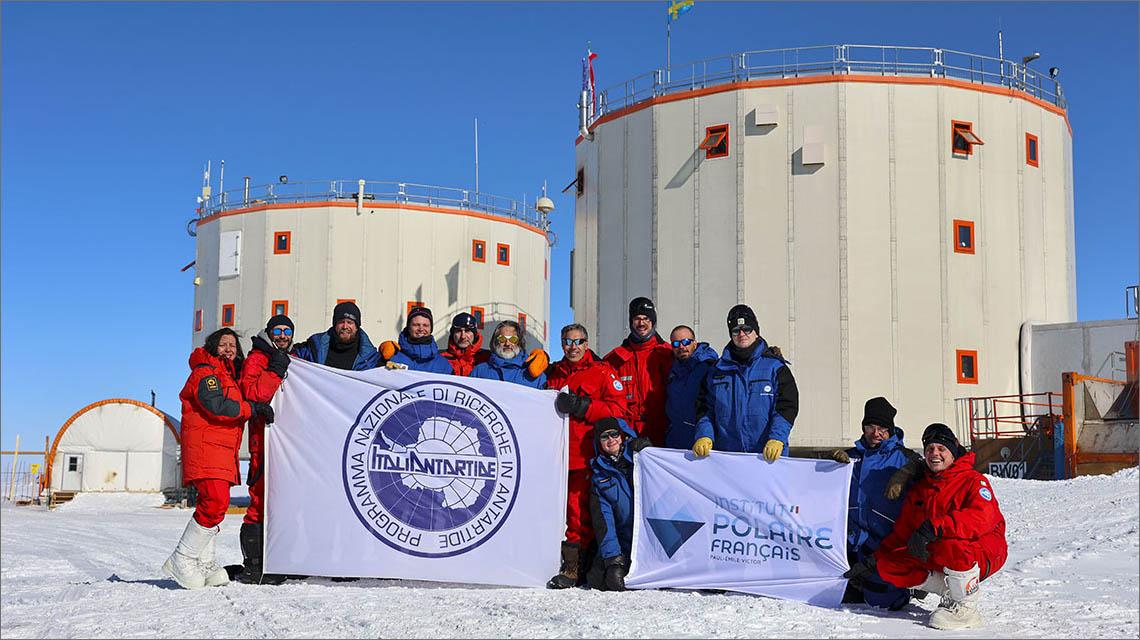Italian National Agency for New Technologies, Energy and Sustainable Economic Development

Antarctica: Winter campaign to study climate and biomedicine takes off
The Zucchelli base closes but the summer campaign on the icebreaker Laura Bassi continues until March
The 18th winter campaign of the National Research Program in Antarctica (PNRA), funded by the Ministry of University and Research and managed by ENEA for logistics and the CNR for scientific coordination, takes off. “Usually, the beginning of the winter season on the Antarctic plateau marks the end of the summer expedition; this year, for the first time, the research work will continue until the end of March in the Ross Sea aboard the icebreaker Laura Bassi", said expedition leader Alberto della Rovere of ENEA, who coordinates the activities of the Mario Zucchelli Station, from where the last researchers and technicians will reach the US base of McMurdo before continuing on to New Zealand and then to Italy.
The icebreaker Laura Bassi, owned by the National Institute of Oceanography and Experimental Geophysics (OGS), the only Italian vessel capable of operating in polar waters, is currently on its way to New Zealand for the unloading operations and will immediately set sail towards the polar waters for the third and last rotation in Antarctica, during which an oceanographic campaign mainly dedicated to geophysical projects is planned[1].
While on the coast of Baia Terra Nova the Zucchelli station closes, to reopen in October with the arrival of the new summer campaign team, at Concordia 13 winterovers, who include 6 Italians from the PNRA, 6 French from the Paul Emile Victor Polar Institute (IPEV) and 1 Swedish doctor from the European Space Agency (ESA), are preparing to spend nine months in complete isolation. In fact, throughout the polar winter the station cannot be reached, due to the bone-chilling temperatures which can dip below minus 80 ° C.
Research and maintenance activities will continue during this period as well, until the team for the next summer campaign arrives in November. In these nine months, studies on climate, glaciology, atmospheric physics and chemistry and biomedicine will be conducted.
During the current 37th summer campaign, over 50 research projects have been conducted on topics like life sciences, earth, atmosphere and space. The data collected in Antarctica will be processed in the coming months at the Italian laboratories that took part in the projects.
220 researchers and technicians participated in the expedition, including 18 military experts from the Army, Navy, Air Force, Carabinieri Corps and Fire Brigade.
All the participants in the summer expedition were chosen from experienced personnel since the pandemic made it impossible to train new staff, except for the Concordia winterovers who completed their fire and outdoor and indoor risk management training upon arrival at the base.
Italy, by adopting the strict health protocol developed last year by the Council of Directors of Antarctic National Programs (COMNAP), has succeeded in preventing the spread of COVID in its bases.
9 intercontinental flights operated with the C-130J of the 46th Air Brigade of the Italian Air Force (AMI) and one with the Airbus-A319 of the Australian Antarctic Division were used to transport personnel and materials between Christchurch (New Zealand) and the Italian Mario Zucchelli base.
The vessel Laura Bassi was also used to move personnel and materials arriving and departing from Antarctica during two of the three scheduled rotations between New Zealand and the Mario Zucchelli station.
During the 37th summer campaign, the remote camp at Little Dome C, 35 km from Concordia station, was set up and the ice drilling activities of the project "Beyond Epica Oldest Ice", to extract some of the oldest ice on the planet at a depth of about 2,700 metres began, to understand how our climate and atmosphere changed over 1.5 million years.
"This year’s campaign was standard both in number of people involved and for logistical and scientific work conducted, despite the continuation of the COVID-19 emergency and all the measures put in place to prevent the spread of the virus in the Antarctic continent”, said Elena Campana, head of the ENEA Technical Unit for Antarctica. "One of the most challenging situations we had to deal with during the expedition was to the emergency care provided to an accidentally injured Russian sailor aboard a UK-flagged fishing vessel in the Ross Sea.
An action which earned an official thanks from the London government to all PNRA staff who coordinated transportation by helicopter of the injured person at the Mario Zucchelli base, first aid and medical checks, including stabilization of the wound and molecular swabs, in full compliance with the anti-Covid protocol ”, concluded Elena Campana.
Photo gallery
For more infomation:
www.italiantartide.it - www.pnra.aq
www.facebook.com/italiantartide/
www.instagram.com/italiantartide/
Disclosure report on the 36th expedition to Antarctica (italian language)
Due to the complexity of the activities conducted and the difference in time zone (the Italian-French "Concordia" base is six hours ahead of Italy), please arrange the interviews with the researchers by writing to:: , , ,
